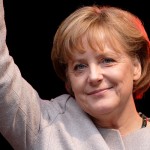
Revised: 01/01/14 (Corrected sentence in red) The integration of Europe moved forward this week following several important events.

On Dec. 15, Angela Merkel was re-elected for the third time as German Chancellor. Her victory was made possible through the coalition of her Christian Democrat party (CDU) and the Social Democrats (SPD).
The composition of her new government gives an indication on the future policies of Germany. Among the nine CDU ministers, Wolfgang Schauble will remain as the indispensable minister of finances and as such will guarantee a certain continuity. The crucial post of economy/energy will be occupied by an SPD member. So will foreign affairs, to be headed by pro-European Walter Steinmeier. It is interesting to note that for the first time a woman will be in charge of Defense: Ursula von der Leyen, 51, is close to Angela Merkel, French-speaking and a mother of seven. The ministry of immigration is also to be headed by a woman who, even more significantly, is of Turkish origin.
There is no deep ideological difference between the CDU and SPD parties. French analysts stress that it would be a mistake to assimilate the German social democrats to the French socialists. The former are “center left” rather than “left”.
According to tradition, Merkel’s first official visit abroad was to France. Her next stop was Brussels to attend the summit meeting of the European Council. Arduous negotiations led to important decisions – as important, some experts say, as the creation of the Euro currency.
Merkel will likely not abandon her general policy of financial discipline, but rather relax her hard austerity line. Germany’s economic policy will be slightly less liberal. A minimum wage of 8.5 euros is to take effect within three years. The new program will reduce the number of “poor workers” and should give a boost to the domestic consumption. It will also alleviate criticism expressed by other European countries of unfair competition on the labor market.
A banking union and the European defense were the main topics of discussion. The creation of a banking union is intended to put a stop to the bailout of failing banks at the expense of taxpayers. So far, financial support for countries in trouble, such as Greece or Spain, has been funded primarily by Germany (27 percent) and France (20 percent.)
Merkel has always been against the “mutualisation” of the sovereign debts. The new directives give greater power to the Banque Centrale Européenne (BCE – Central Bank of Europe) over the banks in order to prevent speculative investments. The BCE will also oversee the creation of a “funds of resolution,” financed by the banks, which will amount to 55 billion by 2026. Brussels will only intervene in case of urgent crisis. Obviously it will be hard for many of the states to lose sovereignty over their own budget.
The other subject of discussion in Brussels was the European defense. For Germany, defense is almost a taboo and most European states – except France – are unwilling to interfere in foreign military conflicts. Some progress though was made in specific areas such as cyber security, refueling of planes in the air, the use of drones by 2025 and controlling piracy along the Somalian coast. A limited amount of logistical and financial support is likely to be welcomed, particularly by France, who acted alone in both Mali and the Republic of Central Africa.
The Franco-German ” couple” appears now to be returning to center stage. As seen from France, the new developments are generally well-accepted by economists and other specialists. Overall, they seem to be impressed by the pragmatic behavior of the Germans and believe the German vote was a smart one – indeed, a rare mark of approval to be found in French opinion of German politics.
 About the author: Nicole Prévost Logan divides her time between Essex and Paris, spending summers in the former and winters in the latter. She will write a regular column for us from her Paris home where her topics will include politics, economy, social unrest — mostly in France — but also in other European countries. She also will cover a variety of art exhibits and the performing arts in Europe. Logan is the author of ‘Forever on the Road: A Franco-American Family’s Thirty Years in the Foreign Service,’ an autobiography of her life as the wife of an overseas diplomat, who lived in 10 foreign countries on three continents. Her experiences during her foreign service life included being in Lebanon when civil war erupted, excavating a medieval city in Moscow and spending a week under house arrest in Guinea.
About the author: Nicole Prévost Logan divides her time between Essex and Paris, spending summers in the former and winters in the latter. She will write a regular column for us from her Paris home where her topics will include politics, economy, social unrest — mostly in France — but also in other European countries. She also will cover a variety of art exhibits and the performing arts in Europe. Logan is the author of ‘Forever on the Road: A Franco-American Family’s Thirty Years in the Foreign Service,’ an autobiography of her life as the wife of an overseas diplomat, who lived in 10 foreign countries on three continents. Her experiences during her foreign service life included being in Lebanon when civil war erupted, excavating a medieval city in Moscow and spending a week under house arrest in Guinea.